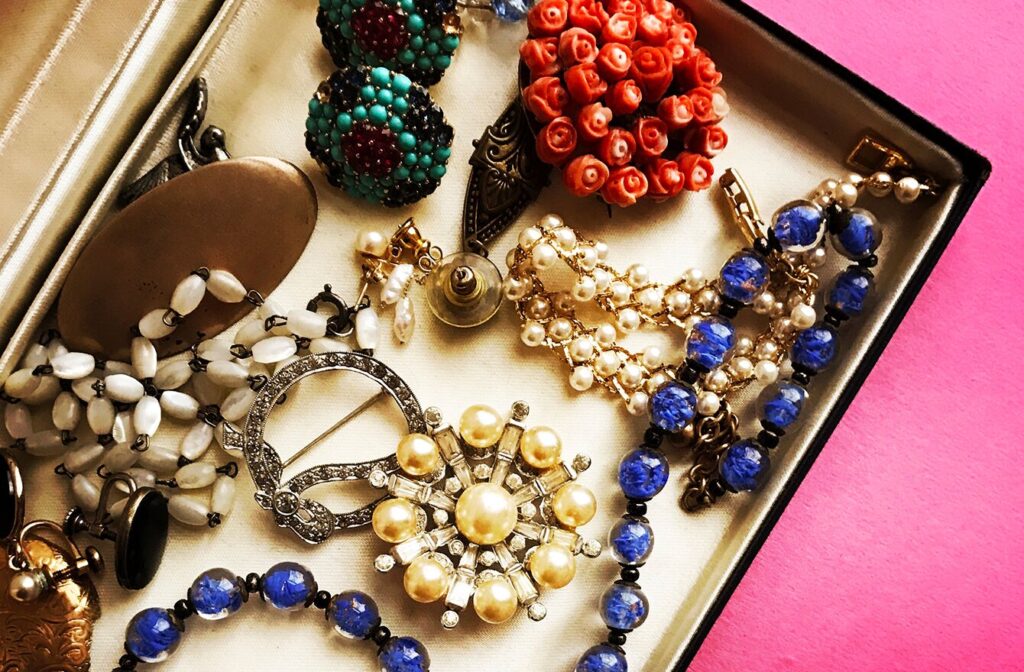I have several trinkets in my jewelry box. Most of them I hardly ever wear. I’ve never been much for baubles and dangly things anyway. But last Sunday, while I was getting ready for church, I had a few minutes to browse through my collection and find some “adornments” for the day. I had a lot of choices.
There are many pieces that Dennis has given me over the years. Necklaces, bracelets, and rings that are of the highest quality – purest gold and high-clarity diamonds. They aren’t showy but they are beautiful. I have some inherited pieces that have sentimental value mostly, but are still solid and lovely. I also have some pieces that I’ve gotten as souvenirs: Jade from Guatemala, turquoise from New Mexico, hand painted lockets from Germany.
And then I have the cheap stuff—large earrings that sparkle, bracelets that practically light up, necklaces that’ll knock your socks off! Ironically, when I’m choosing something for a dress-up affair, I’ll choose these over the high-quality things. Why? They sparkle. They show off.
Sunday morning, I decided to go not with the sparkly things, not the nostalgic things, but the real, authentic gold and diamonds. Since I was going to corporate worship, I thought that I’d go with the real stuff. Of course, only I would realize the value of my adornments, but I felt better knowing that what I had on was genuine—pure—hopefully like my presentation of myself to the Lord.
Authenticity is something that’s hard to identify these days. There’s so much CGI (computer-generated imagery) in movies, TV shows, and even commercials (i.e. The Super Bowl) that give us the illusion of reality, that our brains struggle to weed out those things that aren’t real at all. Coca-Cola used to have a commercial with a jingle that says that Coke is the real thing. Odd that that drink is all artificial flavors and colors.
Sincerity is another word that is used to describe the authentic Christian as opposed to one who is all “show.” Our word “sincerity” has its meaning from a Latin word that calls out the practices of dishonest sculptors in ancient Greece and Rome as they would fill in and cover their chiseling mistakes with wax to deceive the viewer. The compound word that we use is sine = without – cera = wax. Without wax. This concept not only applies to our lives, but to our personal worship.
But is just being sincere enough to make us pleasing to Almighty God? Here’s a story I once heard that explains why this concept alone could be lacking:
The three-alarm fire started in an upstairs bedroom. By the time the first responders arrived, the building was in full blaze. A young couple and their three-year-old son stood outside huddled together, all sharing a blanket.
“My baby, my baby is still in there!” the mother shouted. “She’s still in her crib.”
The brave fire fighter rushed into the burning building, battling the smoke and flames. Finally, he saw the infant’s crib. Quickly, the man grabbed the child, wrapped it in a blanket, and prayed that he’d make it out of the house alive with the baby. Outside, the mother rushed to the fire fighter, grabbed her baby, and began to thank the man for the rescue. But then, her relief turned to horror. As she peeled back the layers of the tiny blanket, she didn’t see the beautiful face of her child, but the artificial features of a life-like doll that had been lying next to the infant. The fire fighter truly believed that he had picked up the child, but he had been mistaken. A classic case of being sincere, but being sincerely wrong. How do you know you’re being authentic and sincere?
For the word of the LORD is right; and all his works are done in truth. (Psalm 33:4)
You can’t go wrong if you are authentic, sincere, but also grounded in Truth.
.
